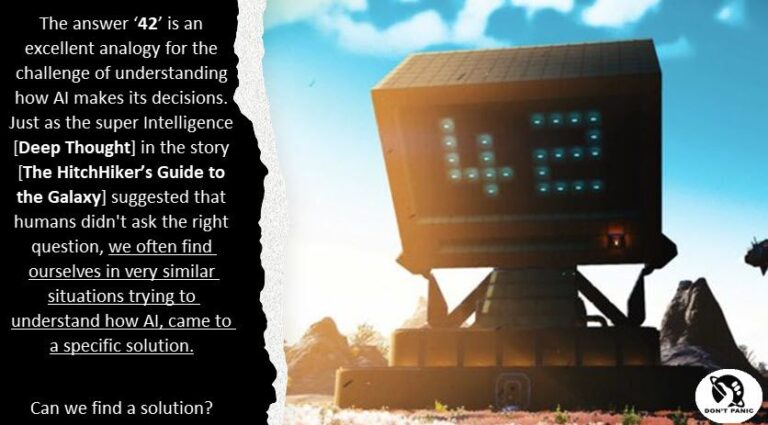We are all about to hear a lot about OpenAI Creating autonomous agents that can operate independently. While this is an intriguing concept, It reminds me of the issue with The HitchHiker’s Guide to the Galaxy. When the 𝑡ℎ𝑒𝑛 ’Super Computer”, 𝑛𝑜𝑤 understood as “AI” is asked to find the “𝐴𝑛𝑠𝑤𝑒𝑟 𝑡𝑜 𝑡ℎ𝑒 𝑈𝑙𝑡𝑖𝑚𝑎𝑡𝑒 𝑄𝑢𝑒𝑠𝑡𝑖𝑜𝑛 𝑜𝑓 𝐿𝑖𝑓𝑒, 𝑡ℎ𝑒 𝑈𝑛𝑖𝑣𝑒𝑟𝑠𝑒, 𝑎𝑛𝑑 𝐸𝑣𝑒𝑟𝑦𝑡ℎ𝑖𝑛𝑔.” After much calculation, it reveals that the answer is simply 42.
𝐈𝐟 𝐲𝐨𝐮 𝐫𝐞𝐚𝐝 𝐚𝐧𝐲𝐭𝐡𝐢𝐧𝐠. 𝐑𝐞𝐚𝐝 𝐭𝐡𝐢𝐬: The answer ‘42’ is an excellent analogy for the challenge of understanding how AI makes its decisions. Just as the super Intelligence in the story suggested that humans didn’t ask the right question, we often find ourselves in very similar situations trying to understand how AI, came to a specific solution.
I don’t think humans will be satisfied with framing the question or having clear objectives. I believe that governance can be built into AI with these aspects:
𝐓𝐫𝐚𝐧𝐬𝐩𝐚𝐫𝐞𝐧𝐜𝐲: Understanding the “how” is critical to genuinely comprehend the AI’s algorithmic process.
𝐅𝐞𝐞𝐝𝐛𝐚𝐜𝐤 𝐌𝐞𝐜𝐡𝐚𝐧𝐢𝐬𝐦: Ensure human perspective still has a place. Feedback to the AI to express concerns, seek clarifications, and be able to refine the AI’s decision-making.
𝐌𝐞𝐧𝐭𝐨𝐫𝐬𝐡𝐢𝐩 & 𝐄𝐝𝐮𝐜𝐚𝐭𝐢𝐨𝐧: A good mentor, knows that everyone has different strengths and weaknesses. Taking a Socartic method and building in the tutored mentorship can ultimately help bridge the gap between AI’s decisions and human understanding. (𝑆𝑜𝑐𝑟𝑎𝑡𝑒𝑠 𝑤𝑎𝑠 𝑡ℎ𝑒 𝑤𝑖𝑠𝑒𝑠𝑡 𝑜𝑓 𝑎𝑙𝑙 𝑝𝑒𝑜𝑝𝑙𝑒 𝑛𝑜𝑡 𝑏𝑒𝑐𝑎𝑢𝑠𝑒 ℎ𝑒 𝑘𝑛𝑒𝑤 𝑒𝑣𝑒𝑟𝑦𝑡ℎ𝑖𝑛𝑔 𝑜𝑟 𝑎𝑛𝑦𝑡ℎ𝑖𝑛𝑔, 𝑏𝑢𝑡 𝑏𝑒𝑐𝑎𝑢𝑠𝑒 ℎ𝑒 𝑘𝑛𝑒𝑤 𝑤ℎ𝑎𝑡 ℎ𝑒 𝑑𝑖𝑑 𝑛𝑜𝑡 𝑘𝑛𝑜𝑤.)
This approach aligns with the id, ego, and super-ego analogy, where each agent represents a different aspect of AI decision-making.
The (𝐐𝐮𝐢𝐜𝐤 𝐜𝐨𝐧𝐝𝐞𝐧𝐬𝐞𝐝 𝐕𝐞𝐫𝐬𝐢𝐨𝐧)
• Efficiency: A collective of Specialized autonomous agents (ID) can efficiently handle various aspects of AI’s cognitive processes.
• Consistency: The unified decision integration layer (EGO) helps maintain consistency and coherence in AI responses.
• Ethical Alignment: The ethical framework (SUPER-EGO) ensures that AI’s actions are in line with established ethical guidelines.
However, challenges may include complexity in system design and potential conflicts between autonomous agents (That’s for way smarter people to figure out). Although, in the end, it could be a step toward building AI systems that are not only capable but can also comprehend humanity better, fostering greater trust and collaboration between humans and AI.
𝗡𝗼𝘁𝗶𝗰𝗲: The views expressed in this post are my own. The views within any of my posts, or articles are not those of my employer or the employers of any contributing experts. Like 👍 this post? Click the bell icon🔔for more!



